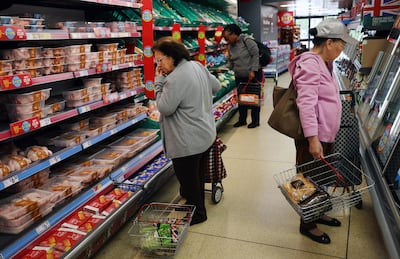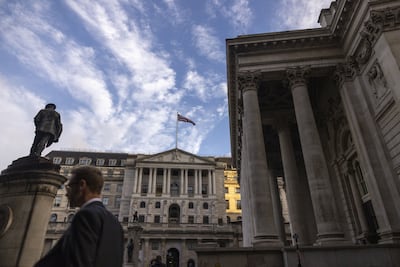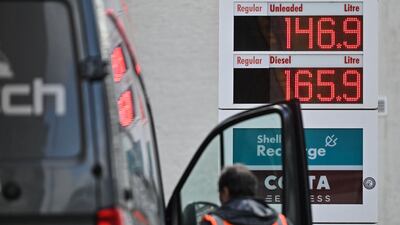The rate of inflation in the UK fell to 6.7 per cent in August, despite a rise in the price of petrol, according to the Office for National Statistics.
It was widely expected that inflation in the month, which follows a reading of 6.8 per cent in July, would rise because of higher oil prices.
On a monthly basis, the Consumer Price Index rose by 0.3 per cent compared with the same month last year.
Meanwhile, the core inflation rate, which is closely watched by the Bank of England and excludes energy and food, rose by 6.2 per cent in the 12 months to August, slowing from 6.9 per cent in July, the ONS said.
Experts said while the number gives the Bank of England some latitude to keep interest rates on hold at its meeting on Thursday, it is more likely that the rate-setting Monetary Policy Committee will increase rates by 0.25 percentage points to 5.5 per cent.
The government has pledged to lower inflation to 5 per cent by the end of the year. The Bank of England's target is 2 per cent.
“Today’s news shows the plan to deal with inflation is working – plain and simple,” said Chancellor Jeremy Hunt.
“But it is still too high, which is why it is all the more important to stick to our plan to halve it so we can ease the pressure on families and businesses.”
At 6.7 per cent, UK inflation is now at its lowest point since February last year.
“The rate of inflation eased slightly this month driven by falls in the often-erratic cost of overnight accommodation and air fares, as well as food prices rising by less than the same time last year,” said Grant Fitzner, chief economist at the ONS.
“This was partially offset by an increase in the price of petrol and diesel compared with a steep decline at this time last year, following record prices seen in July 2022.
“Core inflation has slowed this month by more than the headline rate, driven by lower services prices.”

Food prices
Food price inflation fell to 13.6 per cent in the year to August, down from 14.9 per cent in July, and far below the March reading of 19.2 per cent, which was the highest annual rate seen for more than 45 years.
Meanwhile, the annual inflation rate for restaurants and hotels was 8.3 per cent in August, down from 9.6 per cent in July, and the lowest rate since May 2022, the ONS said.
Even though inflation fell when many economists had expected a rise, opposition politicians were quick to point out that the UK still has an inflation rate higher than other members of the G7 group of advanced economies.
“The UK is forecast to have the highest inflation of any major economy this year,” Labour shadow chancellor Rachel Reeves said.
“[Prime Minister Rishi Sunak] is too weak to turn things around, while his predecessor Liz Truss continues to call for the same policies that crashed the economy this time last year.
“The Conservatives have wreaked havoc, and working people are paying the price.”
Bank of England meeting
All eyes now turn to the Bank of England's MPC meeting on Thursday. Many experts predict that even though the August inflation reading was lower than expected, the MPC will push ahead with a 15th consecutive rise in interest rates.
“While easing inflation is positive for the Bank of England as it means its strategy is working, it may be too soon to put the brakes on interest rate hikes just yet if it really wants to tame persistent inflation for good and bring it closer to its target of 2 per cent,” said Alice Haine, personal finance analyst at Bestinvest.
“Instead, the central bank is widely expected to push ahead with a 25 basis-point (0.25 percentage point) hike on Thursday as it looks to win the battle against stubbornly high inflation – even if this risks sending the UK economy into a mild recession.”

The spectre of that mild recession has prompted some economists to argue that the widely-predicted rise in interest rates on Thursday will be the last for a while.
Richard Hunter, head of markets at Interactive Investor, told The National that the surprise fall in the inflation has set “investor tongues wagging ahead of the interest rate decision”.
“The previous conviction was that a further rate rise of 0.25 per cent was nailed on, whereas this number has reduced the consensus to an even split between a rise and a no-change decision.
“It still seems likely that a further rise will follow from the Bank of England tomorrow, although that could well signal the end of the current rate hiking cycle.
“Attention then turns to how long rates will stay at current levels, until the inflationary beast is tamed,” he some.
Meanwhile, Stuart Cole, chief macro economist at Equiti Capital, told The National that the Bank of England now has to “factor in whether today’s numbers really are a sign that demand is cooling – and that the economy is potentially stalling – and whether or not a further hike in rates, that it may see as needed to ensure CPI retains a downwards path, could end up doing more harm than good.
However, should the Bank of England raise interest rates on Thursday, the picture beyond is somewhat cloudier and “very data dependent”, according to Alpesh Paleja, the lead economist at the Confederation of British Industry.
“With the MPC suggesting that rates will remain higher for longer, businesses and households should plan for tighter financial conditions being here to stay.”


